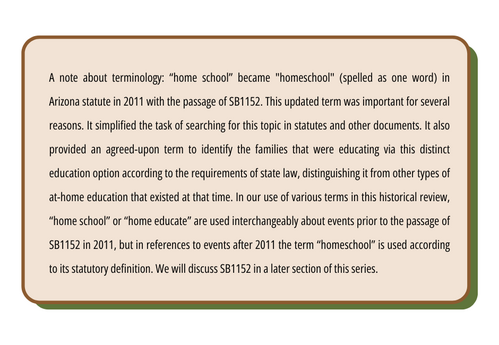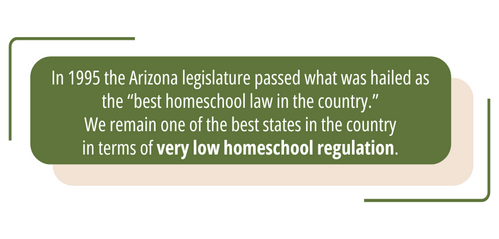Carrying Homeschool Freedom Forward (part 1 of 4)

AFHE'S MISSION & HISTORY
Key Takeaways:
- Many people believe common elements of government educational systems are not necessary to prepare their children to flourish as adults.
- Families who exited the government’s education system experienced conflicts which needed resolution in state law.
- The modern homeschool movement has achieved a high degree of educational independence and seeks to maintain this freedom.
- Families are now adjusting to a rapidly changing educational landscape.
Imagine what you would do to educate your children if there were no public school system, no compulsory attendance law, no federal or state Department of Education, no colleges of education at universities, no teacher certification, and no standardized or norm-referenced testing. How would you provide an education that would prepare them to flourish as adults, maintain the values held in your family and faith community, and become citizens who understand American civic principles?
Over the last four decades, millions of parents across America have become convinced that the regulations and bureaucratic aspects of a public funded system are not needed for the work of educating children. These parents, pioneers of a new educational choice known as home schooling, bravely took on full responsibility for their children’s education, a decision which often put them at odds with local and state authorities. The resulting conflicts had to be negotiated and resolved legislatively. In these negotiations, home school advocates emphasized American principles of freedom, the right of parents to direct the education of their children, and the persuasive power of the educational results these families achieved.
This encapsulates the rise of the modern homeschool movement. Arizona Families for Home Education has been actively supporting and advocating on behalf of home educating families since 1983, with a particular focus on achieving maximum freedom from the government’s educational system. AFHE has influenced and informed both public opinion and government policy about the educational choice that is now widely known as “homeschooling.”
AFHE presents this series of articles for the benefit of those who have recently “dived in” as home educators, and for the many people who have asked for AFHE’s perspective on recent school choice developments. This first article in the series provides a brief review of the progression of homeschool freedom. This will give important context for an examination of the current situation, as well as the dangers we are facing.
Over the last four decades, millions of parents across America have become convinced that the regulations and bureaucratic aspects of a public funded system are not needed for the work of educating children. These parents, pioneers of a new educational choice known as home schooling, bravely took on full responsibility for their children’s education, a decision which often put them at odds with local and state authorities. The resulting conflicts had to be negotiated and resolved legislatively. In these negotiations, home school advocates emphasized American principles of freedom, the right of parents to direct the education of their children, and the persuasive power of the educational results these families achieved.
This encapsulates the rise of the modern homeschool movement. Arizona Families for Home Education has been actively supporting and advocating on behalf of home educating families since 1983, with a particular focus on achieving maximum freedom from the government’s educational system. AFHE has influenced and informed both public opinion and government policy about the educational choice that is now widely known as “homeschooling.”
AFHE presents this series of articles for the benefit of those who have recently “dived in” as home educators, and for the many people who have asked for AFHE’s perspective on recent school choice developments. This first article in the series provides a brief review of the progression of homeschool freedom. This will give important context for an examination of the current situation, as well as the dangers we are facing.
The education landscape has changed rapidly over the last several years, especially with the impacts of the COVID crisis. Although the visibility of home education has risen dramatically and there are more and more families engaged in this endeavor, longtime observers and participants in the homeschool movement warn that we are facing grave risks to homeschool freedom. It is AFHE’s mission and responsibility to monitor these risks and protect homeschooling in Arizona.

Historical Context
In 1982, Governor Bruce Babbitt signed HB2116 into law, providing a home school alternative to meet the requirement of compulsory school attendance and making it clear that home schools were legal. Because the public school model was the best understood form of education delivery and due to suspicion of the parents’ ability to provide an adequate education at home, there were significant requirements placed on home schools: an affidavit had to be filed with the county school superintendent; parents had to pass a proficiency examination before being permitted to teach their own children; students had to take annual standardized tests and those results were provided to the county superintendent; and county superintendents had discretion to evaluate a student’s progress and could require follow-up testing or even terminate home education.
AFHE was formed by parents in 1983 and soon began to actively engage in lobbying and advocacy. AFHE sought improvements and clarifications to the home school law, but it was several years before significant changes were achieved. For example, it wasn’t until 1990 that parent educators were granted the option to choose which standardized test to use for their children. And in 1992, the state of Arizona still required these parents to pass the Arizona Teacher Proficiency Examination.
In 1985 the law was revised to clarify that a home school was not a private school. This helped legislators begin to recognize home schooling as a distinct education option that would not need to be defined based on brick-and-mortar public or private school models. Even so, legislators continued to introduce bills seeking to impose school-like requirements for homeschoolers, such as mandatory testing, a longer period of compulsory attendance, and even increased criminal penalties for failure to comply with the homeschool law. One such bill that passed in 1991 lowered the compulsory age of attendance to six years old. AFHE was able to secure an exemption for home school students to delay formal education until age 8, an exemption illustrating that home schools are separate from the school system.
AFHE was formed by parents in 1983 and soon began to actively engage in lobbying and advocacy. AFHE sought improvements and clarifications to the home school law, but it was several years before significant changes were achieved. For example, it wasn’t until 1990 that parent educators were granted the option to choose which standardized test to use for their children. And in 1992, the state of Arizona still required these parents to pass the Arizona Teacher Proficiency Examination.
In 1985 the law was revised to clarify that a home school was not a private school. This helped legislators begin to recognize home schooling as a distinct education option that would not need to be defined based on brick-and-mortar public or private school models. Even so, legislators continued to introduce bills seeking to impose school-like requirements for homeschoolers, such as mandatory testing, a longer period of compulsory attendance, and even increased criminal penalties for failure to comply with the homeschool law. One such bill that passed in 1991 lowered the compulsory age of attendance to six years old. AFHE was able to secure an exemption for home school students to delay formal education until age 8, an exemption illustrating that home schools are separate from the school system.

AFHE-proposed legislation achieved significant expansions of home school freedoms in 1993. Mandatory standardized testing was reduced to every three years, the Arizona Teacher Proficiency Exam requirement was eliminated, the academic evaluation by county superintendents was dropped, and the affidavit requirement was clarified to be a one-time filing plus a mandatory notification to the county superintendent if home schooling ceased. And in 1995 the Arizona legislature passed what was hailed as the “best homeschool law in the country,”1 which retained the requirements associated with the affidavit but eliminated virtually all other regulations for home educators.
These improvements achieved by AFHE and home school parents all focused on removing the home school model from the jurisdiction and oversight of the public system. Arizona’s homeschoolers have maintained the freedom from government oversight that was achieved through years of lobbying and persuasion. Throughout AFHE’s history, this advocacy work has been performed by volunteers who dedicate hundreds of hours of their time for the cause of homeschool freedom. Because of this work, we remain one of the best states in the country in terms of very low homeschool regulation.
The gains of the last 40+ years are not only measured in legislative wins. We have so much to celebrate and cherish. James R. Mason, President of HSLDA, recently wrote, “Parents in the 1960s, ‘70s, and ‘80s risked legal peril and social stigma to do what homeschoolers take for granted today. Yet homeschooling steadily grew, as more moms and dads just like you and me took the plunge. And as the movement removed more and more legal, social, and practical barriers, together we created a dizzying array of networks, co-ops, and state and local organizations—the rich mosaic we know as homeschooling today.”2 This multifaceted community grew out of necessity, liberty, and private ingenuity.
Our hope for the future is to see families enriched, children flourishing, parents walking in confidence and community, and the continued freedom to educate our children without government involvement. That freedom depends on our nation’s fundamental principles: natural rights, limited government, and individual liberty.
These improvements achieved by AFHE and home school parents all focused on removing the home school model from the jurisdiction and oversight of the public system. Arizona’s homeschoolers have maintained the freedom from government oversight that was achieved through years of lobbying and persuasion. Throughout AFHE’s history, this advocacy work has been performed by volunteers who dedicate hundreds of hours of their time for the cause of homeschool freedom. Because of this work, we remain one of the best states in the country in terms of very low homeschool regulation.
The gains of the last 40+ years are not only measured in legislative wins. We have so much to celebrate and cherish. James R. Mason, President of HSLDA, recently wrote, “Parents in the 1960s, ‘70s, and ‘80s risked legal peril and social stigma to do what homeschoolers take for granted today. Yet homeschooling steadily grew, as more moms and dads just like you and me took the plunge. And as the movement removed more and more legal, social, and practical barriers, together we created a dizzying array of networks, co-ops, and state and local organizations—the rich mosaic we know as homeschooling today.”2 This multifaceted community grew out of necessity, liberty, and private ingenuity.
Our hope for the future is to see families enriched, children flourishing, parents walking in confidence and community, and the continued freedom to educate our children without government involvement. That freedom depends on our nation’s fundamental principles: natural rights, limited government, and individual liberty.
Part 2 in this series will discuss the importance of clearly defining homeschooling.
Articles in this series:
Part 1: AFHE's Mission and History
Part 2: Homeschool is Distinct
Part 3: Is Homeschooling at Risk?
Part 4: Maintaining Freedom Requires Clear Boundaries
Download the complete "Carrying Homeschool Freedom Forward" series as a PDF Here
Part 1: AFHE's Mission and History
Part 2: Homeschool is Distinct
Part 3: Is Homeschooling at Risk?
Part 4: Maintaining Freedom Requires Clear Boundaries
Download the complete "Carrying Homeschool Freedom Forward" series as a PDF Here
ENDNOTES
[1] Dresser, C. (1995). Arizona home school law changes. Arizona Home Education Journal, May/June, 1.
[2] Mason, J. R. (2022). In Defense of Homeschooling: A Response to Critics of Parents’ Rights to Educate Their Children. In S. M. Krason (Ed.), Parental Rights in Peril (p. 171). Franciscan University Press.
[1] Dresser, C. (1995). Arizona home school law changes. Arizona Home Education Journal, May/June, 1.
[2] Mason, J. R. (2022). In Defense of Homeschooling: A Response to Critics of Parents’ Rights to Educate Their Children. In S. M. Krason (Ed.), Parental Rights in Peril (p. 171). Franciscan University Press.
Your donation helps AFHE advocate for homeschool freedom
and serve families across the state.
and serve families across the state.
Recent
Why Summer is the Secret Weapon of Homeschoolers
July 3rd, 2025
Carrying Homeschool Freedom Forward (part 4 of 4)
January 21st, 2025
Carrying Homeschool Freedom Forward (part 3 of 4)
January 15th, 2025
Carrying Homeschool Freedom Forward (part 2 of 4)
January 10th, 2025
Carrying Homeschool Freedom Forward (part 1 of 4)
January 8th, 2025
Archive
2025
2024
2022
March
September
2020
October
